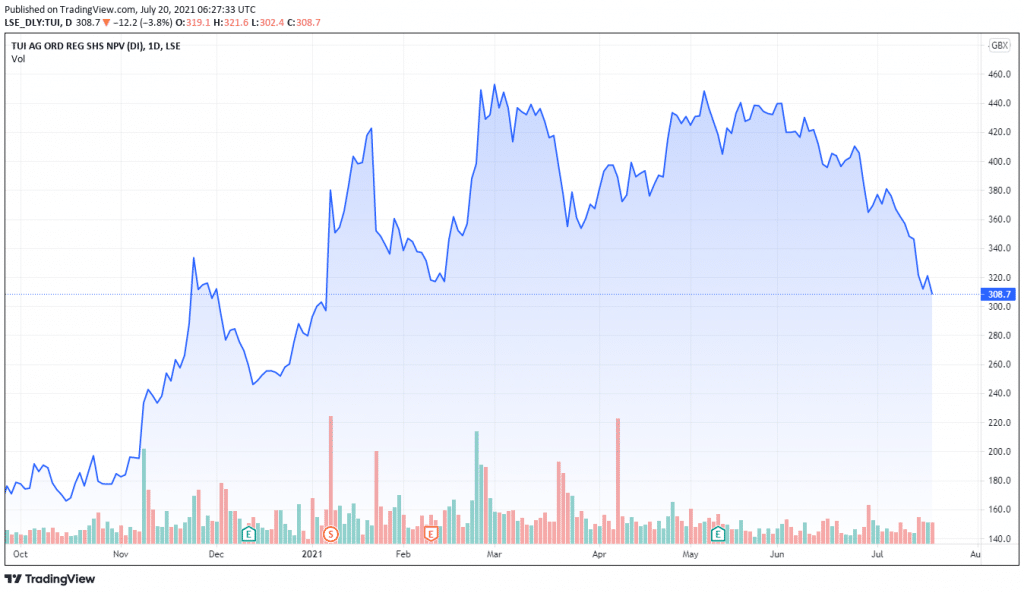TUI Share Price Forecast July 2021 – Time to Buy TUI?
Please note that we are not authorised to provide any investment advice. The content on this page is for information purposes only.
Shares of U.K-based travel agency Tui UK (LSE: TUI) are down 12.2p today after experiencing one of the best performances of its history in 2020. The company has recently changed to flexible working on a permanent basis because of the Covid-19 pandemic.
TUI – Technical Analysis
According to TUI’s financial statement, the company’s market cap is £3.528 billion with total assets worth £12.63 billion. TUI’s revenue for 2020 was at £6.98 billion with a profit margin of -39.63%. This is a significant decrease from 2019’s revenue of £16.73 billion. TUI shares closed on July 19th at £308.7 with a downtrend of -3.80%.

Technical information from TUI reveals a bigger picture. Oscillators such as Stochastic %K (14, 3, 3)(9.7), Commodity Channel Index (20)(−155.6), Average Directional Index (14)(36.4) and Awesome Oscillator(−60.7) are pointing towards a neutral action. On the other hand, moving averages such as Exponential Moving Average (50)(382.3), Simple Moving Average (50)(399.1) and Exponential Moving Average (100)(381.3) are pointing towards selling.
67% of all retail investor accounts lose money when trading CFDs with this provider.
Recent Developments
TUI’s workforce has been largely restricted to working from their homes since the start of the pandemic in March last year. The company then realised that its staff can manage their office-based roles remotely without losing efficiency. TUI now requires all employees to attend office only once a month to take part in collaborative events and face to face team meetings. TUI has also created a new role called Workspace director, to aid in their transition to a permanent and flexible working approach. However, experts have pointed out that the new regulation will not favour staff such as in-store retail employees, engineers, pilots and cabin crew. Around 3000 of its 10,000 strong workforces have been reportedly affected by this new policy.
Should You Buy TUI Shares?
Many analysts have described TUI’s share price value as kind of a “value trap”. This refers to an organization whose ability to generate profits have been permanently impaired. When it comes to TUI, the company must accept the severe restrictions for its bailouts. It is doubtful whether it can compete with its peers with restrictions in place. In addition, investors must also consider the fact that the global travel and tourism market may have changed permanently. Consumers may opt for holiday options close to home with the threat of travel restrictions looming over them.
The above are ample reasons for investors to avoid TUI for the time being. There is a slight chance that the European travel and tourism industry can recover if they take inspiration from that of the United States. There have also been cases where consumers are spending more on booking luxury packages with their lockdown savings. TUI can take advantage of both customer demand and more spending if these trends start to appear in Europe.






